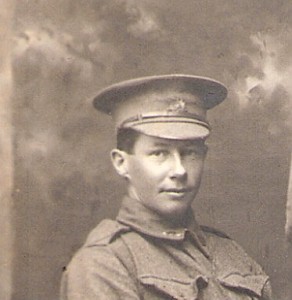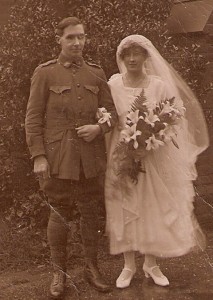WWI Stories – Allan Foster McConnell
Mepunga
Di Saunders shares the story her grandfather, Allan Foster McConnell MBE
 Foster enlisted with his brother Alexander James on 26 July 1915 and was posted to the 14th reinforcements of the 14th Battalion. Two other brothers, Stanley and Ernest, also enlisted. Foster embarked from Melbourne on 18th February 1916 on the HMAT Ballarat bound for Egypt. He later transferred to the 2nd ANZAC Cyclist Battalion before departing Egypt on 21 July 1916 for the fighting in France and Belgium.
Foster enlisted with his brother Alexander James on 26 July 1915 and was posted to the 14th reinforcements of the 14th Battalion. Two other brothers, Stanley and Ernest, also enlisted. Foster embarked from Melbourne on 18th February 1916 on the HMAT Ballarat bound for Egypt. He later transferred to the 2nd ANZAC Cyclist Battalion before departing Egypt on 21 July 1916 for the fighting in France and Belgium.
Apart from being knocked over by a ‘Tommy cavalryman’ who galloped straight at the group of men he was cycling with, about 20 July that year, he stayed clear of injury until 30th September 1917, when he was laying cables near Zonnebeke for the push to Passchendaele. He was struck by shrapnel in the face and throat and shoulder, blinded and fighting for his life. His recovery and rehabilitation was amazing thanks to the King George Hospital and St Dunstan’s. Foster retrained in Braille shorthand, typewriting and string crafts and returned to Australia in 1920 with a new wife, one of his nurses, and a resolve to make things better for returned blinded ex-servicemen like himself. He helped to establish the Australian Blinded Soldiers’ Association and was the Honorary Federal Secretary and Treasurer for 27 years, from 1934 to 1961. For this work he was awarded an MBE in June 1954. His life was one of service to the community – and a love of his family of four sons and their families.
My grandfather, Foster, was an inspiration. As a child he would take me on his knee and tell me stories that he often made up because he couldn’t read me the stories that other grandfathers would have done. He loved telling all his grandchildren these stories. I never felt that he was disabled. He had a wide circle of friends, played blinded soldier bowls, and represented Australia at Bi-Annual Conferences for Blinded Ex-servicemen in Australia and overseas. He led by example. Nothing stopped him doing what he wanted to do. He taught me that being blind was not a disability, and that you just got on with the job, no matter what.
 Foster lived a very rich life. His physical challenges never stopped him from doing what he wanted to do. He often travelled to the area where he was born to visit relatives, attend the races, and to play bowls with other blinded and sighted ex-servicemen. He didn’t have his sight, but I can remember him chopping kindling for the fire without cutting his fingers once, cutting the grass on the front nature strip, washing the dishes, having a wee tipple of brandy, and being great inspiration to his four sons and thirteen grandchildren.
Foster lived a very rich life. His physical challenges never stopped him from doing what he wanted to do. He often travelled to the area where he was born to visit relatives, attend the races, and to play bowls with other blinded and sighted ex-servicemen. He didn’t have his sight, but I can remember him chopping kindling for the fire without cutting his fingers once, cutting the grass on the front nature strip, washing the dishes, having a wee tipple of brandy, and being great inspiration to his four sons and thirteen grandchildren.





